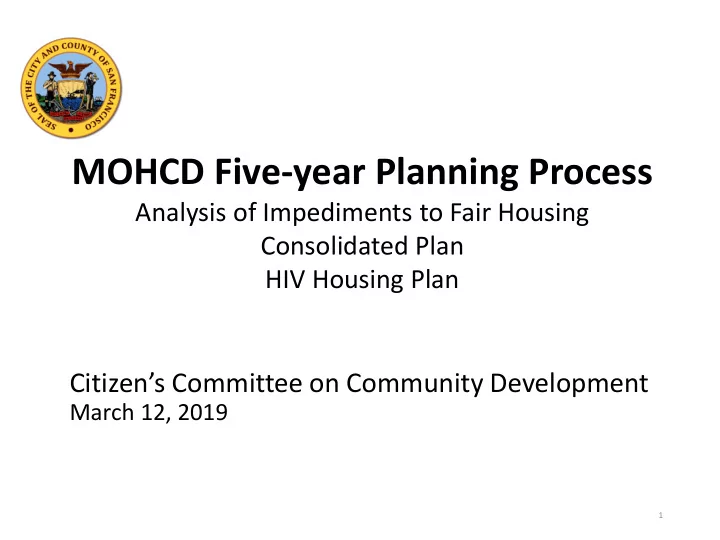

MOHCD Five-year Planning Process Analysis of Impediments to Fair Housing Consolidated Plan HIV Housing Plan Citizen’s Committee on Community Development March 12, 2019 1
Strategic Planning Timeline 2
Strategic Plans • MOHCD Consolidated Plan – Primary MOHCD plan that identifies affordable housing and community development needs and priorities • MOHCD HIV Housing Plan – Focuses on housing-related programs for people living with HIV • MOHCD Analysis of Impediments to Fair Housing Choice – Looks at fair housing issues and how they can be addressed • OEWD Workforce Strategic Framework – Identifies workforce development needs and priorities and informs local and regional workforce plan • Planning Dept. Community Stabilization Strategy – Works to mitigate and prevent displacement and to ensure economic growth benefits existing communities • Planning Dept. Housing Affordability Strategy – Provides a framework to evaluate how housing policies and plans can address housing affordability for the City’s diverse populations 3
Community Engagement Methods Method Target Population Objectives and Outcomes All SF residents and stakeholders, -Broadest input Survey targeting specific hard-to-reach -Quantitative responses groups All SF residents and stakeholders, -Broad neighborhood-based input Community Forums targeting specific hard-to-reach -Validation of what we know groups -Subject matter expertise/deeper dive input Targeted vulnerable groups and Focus Groups -Input from specific perspective (demographic- community advocates focused) -Understanding of City policies and programs Interviews City agency staff -Input from City department perspective Digital Engagement All SF residents and stakeholders -Round-the-clock access to participation -Required; provides a formal opportunity for Public Comment All SF residents and stakeholders stakeholders to provide written input on a drafted document 4
Community Forums Neighborhood/Sup District Date Location Castro/D8 and D7 12/3/2018 Eureka Valley Recreation Center Sunset/D4 and D1 12/10/2018 Ortega Public Library Excelsior and OMI/D11 1/16/2019 Balboa High School Tenderloin/D6 1/22/2019 Kelly Cullen Community Western Addition/D5 1/31/2019 Fillmore Heritage Center South of Market/D6 2/5/2019 Bayanihan Center Mission/D9 St. John The Evangelist Episcopal Church 2/13/2019 Chinatown/D3 and D2 2/19/2019 Telegraph Hill Neighborhood Center Bayview Hunters Point/D10 2/20/2019 Dr. George W. Davis Senior Center Visitacion Valley/D10 2/26/2019 Visitacion Valley Elementary School 5
Focus Groups Target Populations Affordable Housing Developers Cultural Group: Samoan Persons with HIV Artists Cultural Group: Southeast Asian Re-entry/Criminal Justice (Vietnamese, Cambodian, Laotian) (Interview) BMR Developers Victims of Domestic Violence Residents of Subsidized Housing (Interview) BMR renters and owners Eviction Prevention (Tenants) Seniors and Persons with Disabilities Cultural Group: African American Families and Children (Interview) Service Providers Cultural Group: Arab (Interview) Homeless SRO Residents Cultural Group: Faith-based Homeowners/Potential Substance Abuse/Mental Health Homeowners Cultural Group: Filipino HUD Co-Ops TAY (Interview) Cultural Group: Muslim Immigrants/Undocumented Trans Cultural Group: Native American Leasing Agents Veterans Cultural Group: Asian Low-income People Cultural Group: Latino LGBTQ 6
Survey • Two-part public survey • Part 1: Plan-specific and demographic questions • Part 2: MOHCD programs evaluation • Sent outreach email to • 50,000+ housing opportunity email list • MOHCD-funded non-profits • Affordable housing developments • District Supervisors to send to their outreach lists • And others • 1,580 Part 1 responses received to date; 1,070 Part 2 • Review of respondent demographics • What additional outreach is necessary? 7
Staff Interviews City Departments Adult Probation HOPE SF Office of Transgender Initiatives Arts Commission Dept. of Homelessness and Planning Department Supportive Housing Public Defender’s Office Dept. of Aging and Adult Services Human Rights Commission Dept. of Building Inspection Human Services Agency Re-Entry Council Dept. of Children, Youth and Their Human Services Network Rent Board Families Juvenile Justice CC Dept. on the Status of Women SF Housing Authority Dept. of Public Health CMHS Juvenile Probation SFMTA DT/Digital Inclusion Mayor’s Office on Disability SFUSD First Five Office of Civic Engagement and Veterans Administration Immigrant Affairs Five Keys Office of Early Childhood Education 8
Data • Demographic trends/Indicators of need • Housing problems • Low-income/poverty • Lack of access to opportunities, including transportation, high quality public schools, jobs • Utilization of MOHCD and MOHCD-funded programs and services • Equity lenses • Neighborhood • Race and ethnicity • SOGI • Seniors and persons with disabilities 9
Proposed Next Presentations • May 2019 • Review data findings • June 2019 • Review draft strategies • July or August 2019 • Discuss draft RFP 10
Recommend
More recommend